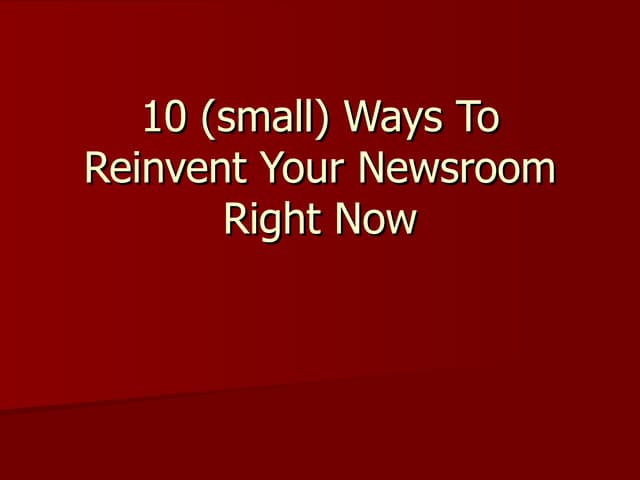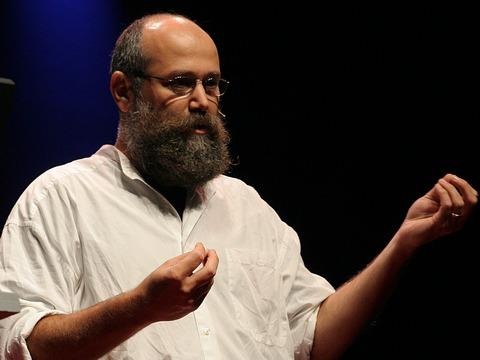
Last week has lead me this generalization: Generation Y fundamentally understands the internet, and therefore the current state of the world, in a way that older generations just never will.
It's a generalization and not a maxim, because as folks like John Bryne, Bryan Murley, and even Steve Jobs remind me that us youngin's aren't the only ones who get it, we're just in the majority. These are my links for March 21st through March 27th:
-
Generation Y, X, BB…
-
 The following are excerpts from #
The following are excerpts from #editorchatfrom John Bryne of Business Week. I'm throughly impressed with his insight. It gives me much hope for the older generations.There will be many Born to the Web enterprises over the next few years that will teach the mainstream media a thing or two. #editorchat
They think that some day online advertising will offset the print decline and help support a broken print model. #editorchat
Online readers also earn more than print readers and are more likely to be female. #editorchat
Of our total audience, about 38% are online only; 31% magazine only & 31% are both online and print. #editorchat
There’s overlap in our print and online readers3 but generally our online users are 10 years younger and more highly educated. #editorchat
-
On the other hand, the following is a tweet sent by a
Syracuse Universitystudent during a lecture by Ryan Sholin on 'new media.'@ryansholin I’d prefer that we have fewer citizen journalists. You don’t see me trying to be a citizen software engineer or citizen waiter.
Put this up there as Generation Y not “getting it”
This is a great presentation. Details some really simple and some more complex things that you could start doing today if you got your newsroom excited about them. -
2020 vision: What's next for news: A fantastic bit of futurism on the journalism business. - Industry will shrink/re-make itself- The semantic web plays a huge role and datamining becomes key
- Collaboration among local news sites for ads and info - New business models like endowments, non-profit, etc
- Copyright law needs a re-think
- The idealist unbiased journalist dies, starts reporting for interest groups
-
Newspaper ownership and the fourth generation syndrome | yelvington.com: Steve argues that the current generation of newspaper owners are more interested in spending money than their own business.
-
When I got my first computer back in 1984 or 1985, it was a Mac and there was this program called Hypercard by Bill Atkinson. In a very basic way, Hypercard teaches you the basics of how computers [and software development on them] work.” Being who I am, this obviously struck a chord. I wondered if he has hit upon a simple truth about the evolution of computers… and their users. Early on, the software and tools that were available to users were more about working with the capabilities of the machine than what you could get done with it. That lead to every computer user innately understanding the architecture of the machine. Of course, it also lead to scaring many people off, but for those that stuck around, to this day we all have a very true understanding of the what, why and — most importantly — how a computer can (and can’t!) do the things it does.
—At SXSW Michael Penn Talks iTunes, Film, Music, and Hypercard! - The Mac Observer
-
Newspaper Execs: Still Sleepless in Seattle - ClickZ: Vin speaks from personal experience about the staff and history of the Seattle PI. In Vin’s opinion, the staff is top notch, but the Hearst Corp. has shackled them. -
Journalism Business Models
-
Yochai Benkler: The new open-source economics
-
Nonprofit journalism: It's in the numbers: Presents numbers dating back to 2006 on the average number of bylines, pages, and sections in the local paper. It’s not really good news. -
Md. Senator Proposes Nonprofit Status For Newspapers - Baltimore News Story - WBAL Baltimore: Current rules don’t allow print media to report on political issues (apparently). A senator has stepped forward and suggested that we allow them to do so.
-
A scenario for news BuzzMachine: Think of this one more like a “Jarvis Manifesto”
-
“The most profitable newspapers have tended to be monopoly markets with circulation of 20,000 to 100,000 readers. These are not sexy papers like The New York Times and The Wall Street Journal, which have historically have significantly low margins.”-
One Banker’s Plan to Save the Newspaper Industry - Deal Journal - WSJ -
Why Advertising Is Failing On The Internet: Controversial post by a UPenn Prof. He refers to his own research on how people interact with ads. Most interesting: the break downs of what and how you can sell online.
-
“The problem is not the medium, the problem is the message, and the fact that it is not trusted, not wanted, and not needed.”- Why Advertising Is Failing On The Internet
-
The wonder of the web is that it gives readers more and more control every day over what information they consume. Fighting against that trend is futile. Trying to improve the banner ad is like trying to motorize a horse.
-
Just plain nifty/WTF?
-
The Internet Archive's Wayback Machine gets a new data center: Apparently the entire internet can fit into a shipping containter. 4.5 petabytes, 1TB RAM, and 63 servers. -
The 13 Most Essential Plugins for WordPress - Nettuts+: Totally fantastic list. -
What Happened to the Land of the Free?: Very long, very detailed piece arguing that the government has become too powerful. Well researched, well opined. -
BBC NEWS | Americas | US high school 'held cage fights': WTF!? A Dallas school was holding cage fighting matches, with students!?
-
Goodbye Google | stopdesign: Google’s top designer quits ostensibly because Google doesn’t understand good design. Here’s the thing: they’re still successful. They don’t have Microsoft levels of shitty design, so what’s the…
-
For the Photogs in the house…
- Amy O'Leary of The New York Times shares audio tips
Amy O'Leary is a multimedia producer at the Times. This interview was taped on March 22, 2009, at the Nieman Conference on Narrative Journalism, where O'Leary was a speaker.

